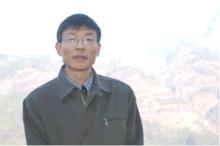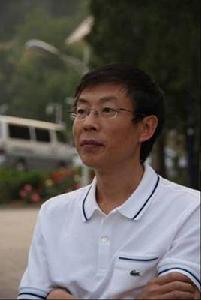人物經歷
1983年畢業於北京師範大學物理學系,1988年獲理學碩士學位,1997年獲系統理論
 狄增如教授
狄增如教授專業理學博士學位;現為北京師範大學管理學院教授,博士生導師,任管理學院黨總支書記。
社會兼職
2006.12- 中國“雙法”學會複雜系統研究委員會 常務理事
2003.10- 全國高等教育自學考試教學指導委員會專業委員會物理組 秘書長
主講課程
本科生課程: 數學模型; 普通物理學;
研究生課程:非線性動力學; 自組織理論。
研究方向
主要從事非平衡系統理論、複雜性研究及相關理論在社會經濟和生物系統中的套用研究工作。在收益遞增與經濟成長的雙穩態,社會分工產生機制的數理描述,加權複雜網路的結構、演化和功能等方面取得了一些研究成果。目前關注的研究領域為複雜性研究,特別是複雜系統個體之間局域的相互作用與巨觀層次上複雜行為的關係。具體的研究方向包括複雜網路、Multi-agent系統的集體行為、經濟和生物系統中組織和結構的湧現等。
主要貢獻
科研項目
1.國家教委留學回國人員科研啟動基金項目:非均勻介質中螺旋波的動力學行為,2002年6月.
2.國家自然科學基金重大項目一級子課題(項目號:79990580):支持巨觀經濟決策的綜合集成方法與系統學研究, 1999年6月-2004年5月.
3.國家自然科學基金項目(項目號:60003018):遺傳算法收斂複雜性及其在科學發現中的套用;2001年1月-2003年12月.
4.國家自然科學基金理論物理專項項目(項目號:19847005):經濟系統複雜性研究,1999年1月-2001年12月.
5.國家教委博士點基金項目: 經濟發展的非平衡系統理論, 1992年8月----1995年2月.
6.國家社會科學基金重點項目-信息科學與經濟系統-子項目: 經濟系統演化模型及其動力學機制研究, 1992年10月----1994年10月.
7.國家自然科學基金項目: 非平衡系統理論及其在教育經濟系統中的套用,1988年1月----1990年12月.
8.國家自然科學基金項目: 中國城鎮人口演化的自組織理論, 1987年1月----1989年12月.
發表論文
1.姜璐,狄增如,中國城鎮人口空間分布的自組織模型,北京師範大學學報(自然科學版)1990年第3期,101-104.
2.Jiang Lu, Di Zengru, The Quantitative Analysis of Spatial Distribution of
Population, The Proceedings of the International System Dynamics Conference,
1991.8, The System Dynamic Society, Bangkok, 312-318.
3.狄增如, 姜璐, 時間延遲正反饋結構及其離散動力學行為, 北京師範大學學報(自然科學版)1990年第4期, 28-33.
4.狄增如, 姜璐, 學校教育系統的演化與控制, 系統工程理論與實踐, Vol.13, 1993年第2期, 17-22.
5.Di Zengru, The Nonlinear Dynamic System Model of Regional Economic Cooperation
and Development, in: Systems Science and Systems Engineering (Proceedings of
ICSSSE’93), International Academic Publisher, 1993, 681-684.
6.Di Zengru, M. Sanglier, A two-dimensional logistic model for interactions of
demand and supply and its bifurcations, Chaos, Solitons & Fractals, 1996, Vol.7,
No.12, 2259-2266.
7.Di Zengru, Complex dynamics in regional economic cooperation and development,
Proceedings of International Symposium on Regional Economic Dynamics and
Economic Sustainable Development for East Asia, Beijing,1996.
8.狄增如,一個演化的複雜系統-經濟,科學中國人,1996,第11期,76-79
9.Di Zengru, Fang Fukang, Investment for technology progress, increasing
marginal products and bistable state of economic growth, in: Fang Fukang, M.
Sanglier, eds. The Complexity and Self-organization in Social and Economic
Systems, Berlin: Springer-Verlag, 1997, 84-93.
10.狄增如,非線性與經濟系統演化, IN: 馮長根,李後強, 非線性科學的理論,方法和實踐,科學出版社,1997,172-183.
11.狄增如, 複雜系統研究及其在其他科技領域中的套用(上),科學中國人,1997,第10期,31-35.
12.狄增如,複雜系統研究及其在其他科技領域中的套用 (下),科學中國人,1997,第12期,33-36.
13.Di Zengru, A nonlinear model for the evolution of a small open developing
economy, in: Gu Jifa ed. Systems Science and Systems Engineering, ICSSSE’98,
Beijing, Scientific and Technical Documents Publishing House, 1998, 496-501
14.Di Zengru, Li Maoling, The nonlinear dynamical model for the evolution of
Productivity, Journal of Systems Science and Systems Engineering, Vol.7, No.4,
1998, 445-456.
15.狄增如,複雜系統研究及其對經濟系統分析的影響,全國青年管理科學與系統科學論文集,南開大學出版社,1999,691-198.
16.Di Zengru, Zhou Ya, Wang Dahui and Wang yougui, Variant Returns on Scale and
the Dynamics of Industrial Structure, The 1st Sino-Japan workshop on
Meta-synthesis and complex systems, Beijing, China, 2001.
17.Wu Jingshan, Di Zengru and Yang Zhanru, The labor division as the results of
phase transition, The 2st Sino-Japan workshop on Meta-synthesis and complex
systems, Shanghai, China, 2002.
18.Di Zengru, Chen Jiawei, Wang Yougui and Han Zhangang, Agent division as the
result of global optimizing evolution, in: Shi Zhongzhi and He Qing eds.
Proceedings of International conference on intelligent information technology,
Posts & Telecom Press, 2002, 40-46.

